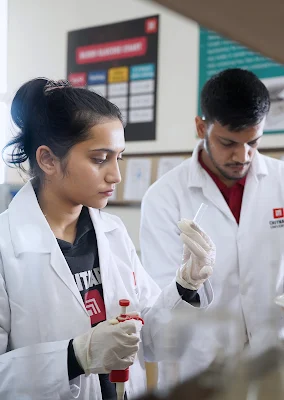Medical imaging technology is the science that uses methods including X-rays, ultrasounds, MRIs, computed tomography, and positron emission tomography to diagnose and treat diseases. In the beginning, X-rays are used to diagnose or treat patient injuries, whereas less invasive methods such as ultrasound, MRI, CT scans, and other similar tests are used to diagnose and treat diseases afterwards. The excellent employment possibilities for these courses have led to the inclusion of Medical Imaging Technology courses in the curricula of numerous foreign and domestic institutions and colleges. Our blog on B.Sc. Medical Imaging Technology is here for you. Through this site, you will learn everything you need to know about medical imaging technology.
Overview of the B.Sc. in Medical Imaging Technology
A field of medicine called medical imaging technology helps to identify and treat disease.
X-ray radiography, ultrasonography, computed tomography (CT), positron emission tomography (PET), fluoroscopy, and magnetic resonance imaging are a few of the imaging methods used to identify or treat disorders (MRI).
Candidates interested in widening their perspectives in the field of medical research and development might consider a B.Sc. in Medical Imaging Technology.
The best applicants would be adept at managing their time, capable of working under pressure, precise data collection, making analytical decisions, using lab equipment, and operating computers.
Candidates for the course should have an attention to detail, precision, independence, self-motivation, and the capacity to work long hours.
The significance of a B.Sc. in medical imaging technology
There are several reasons why students decide to pursue this field as a career. However, the following are some of the theme's fundamental advantages:
It gives students specialised understanding of the discipline of radiography, which focuses on taking pictures of the body's internal organs and subsequently treating illnesses that are identified in certain bodily parts.
It provides students with in-depth understanding of therapeutic and diagnostic radiography, which is beneficial in the treatment of cancer.
Medical imaging technology offers a wide range of prospects and a promising career path.
Graduates in medical imaging technology typically earn between INR 7,000 and INR 12,000 as their first wage in reputable facilities.
Additionally, students can continue to work toward their master's degree in the same subject, which will improve their academic performance.
Eligibility Requirements for B.Sc. Medical Imaging Technology
Students pursuing a B.Sc. in Medical Imaging Technology must fulfil the necessary admission criteria. Before applying, one should evaluate the requirements and determine whether they meet the requirements for the B.Sc. in Medical Imaging Technology. The basic criteria for enrollment in the B.Sc. in Medical Imaging Technology are listed below. –
Students must have completed grades 10+2 from an accredited institution with at least 50% of the required grades.
Candidates must successfully finish their 10+2 in the science stream with a focus on biology, chemistry, and physics.
Candidates must pass entrance tests held at the national or university level in order to be admitted to elite universities.
Qualifications needed for a B.Sc. in Medical Imaging Technology
The following qualities are necessary for a job in medical imaging technology:
Analysis Capabilities
Observational abilities
Research abilities
Understanding of biology
Technical Resources Operation
A passion for science and technology
Skills for Critical Thinking
A passion for science
Skills in Communication
Specialisation Courses for the B.Sc. in Medical Imaging Technology
Machine intelligence
Technology for the Body
Artificial Reality
Online Reality
Atomic Imaging
During Surgery Imaging
A prestigious university, Chitkara University provides top-notch instruction, research, and innovation. We are dedicated to providing the best possible care for our students. We developed an Honors coursein Medical Radiology and Imaging Technology for this reason. The programme allows students to complete their B.Sc(H) degree together with a second certificate from Chitkara electives in their major discipline throughout their time at this university. These courses will guarantee that you gain a thorough awareness of all facets of radiology, as well as principles and practises for imaging technologists, therapeutic agents, and other topics.













